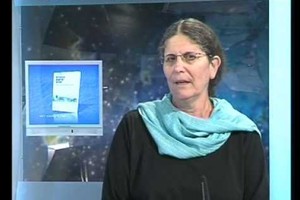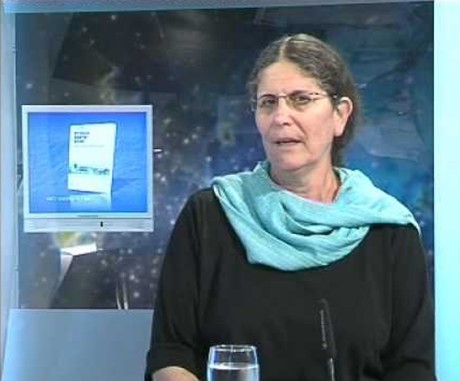
The Negev Coexistence Forum for Civil Equality (NCF) Executive Director, Haia Noach, received notification last week of additional charges being laid against her following the incident during the sixth demolition of Al-Arakib, in the Negev, on October 13, 2010.
The two new charges are “disturbing a policeman in his duty” (article 275) and “beating a policeman in his duty” (article 273). The materials indicate that she is being accused of trying to escape the scene – ignoring the fact that she had her hands tightly handcuffed behind her back.
Further, Dr Awad Abu-Freich, a leading Al-Arakib activist was taken in for further questioning at Rahat police station on May 9 and interrogated for more than 3 hours. He believes that the state is preparing their case to lay charges against him.

Haia Noach (photo: Academic TV)
According to Karen Douglas, Resource Development Coordinator (NCF) there are interesting legal developments underway regarding ownership claims in Al Arakib, particularly that of Dr Abu-Freich. Advocates Michael Sfard and Carmel Pomerantz are representing Dr Abu-Freich in this matter and they kindly provided NCF with this update.
By way of background, it is the state’s responsibility to create a land registration system, however, it has failed to do so over all territories in Israel. In most areas in the Negev where there are land ownership claims by the Bedouin, the process has been delayed by the state for over three decades. After being un-frozen in the last ten years, almost all of the land has been registered in the name of the state. Following the establishment of the state in 1948, the Bedouin remained as residents on their lands until the 1950s when the state moved to evict them through legislating to confiscate the land (Land Acquisition Law 1953). In order to rely upon this particular law, it needed to be declared that the area was needed for security, settlement or development reasons (both before the confiscation and in the proceeding period) and that the owners were not present on the land at the time. Thus, in order to fulfil these legal conditions, the government evicted the residents of Al Arakib by ordering them to move temporarily so that military training could be carried out on their land and that once they were finished, they could return. The land was confiscated upon their departure with no warning or advice to the residents.
In the 1970s, Israel began the land registration process in the Negev and announced that whoever has property claims should so declare. The land registration Officer is obligated to register the land in the name of whoever claims it or in case of disputed ownership, transfer the matter to the District Court to decide. In the case of Al Arakib, as with other areas, this process was frozen after the Bedouin residents submitted their ownership claims.
In the 1990s, the Jewish National Fund (JNF – Keren Kayemet) began afforestation work around Al Arakib which prompted the residents to return to their village and to later file motions in the District Court seeking an order that the land be registered in their name. Dr Abu-Freich is among the applicants. In response, the state claimed that this cannot be done on the grounds that the land was already confiscated (and registered in the state’s name in the Deeds registration). Additionally, after over 30 years of deferral the state renewed the land registration process and file counter claims to have the land registered in the state’s name. Thus the case was transferred by the Bedouin land registration officer to the District Court to determine the ownership of the land.
It is procedurally unclear how parties are to prove their claims, however, both sides filed their legal arguments in the matter. Disputably and according to the state, the burden of proof lies with Dr Abu-Freich.
On March 15, 2011 the court delivered an unclear, partial ruling. Judge Shpeser said that even if there is a “narrow gate” to present claims against those in the expropriation certificate, that opportunity has now passed in this particular case (and in fact, in all similar cases) on the grounds of unreasonable delay (laches). In other words, too much time has passed since the 1950s for the court to consider the Bedouins’ arguments as it cannot be checked if they were present or not on the land at the time of the expropriation, and whether the land was used before 1952 for the purposes of security, development or settlement.
Dr Abu-Freich filed an appeal in the Supreme Court on April 26, 2011 and the following day afforestation began work on the disputed land. This led Dr Abu-Freich to file a request on April 28 for a temporary injunction against the state and whoever is working in its name to cease all work. An immediate decision was received providing that until the state responds, the injunction is in force forbidding the state and whoever is working in its name to carry out any work.
The court is expected to reach a decision in the next few days. It is anticipated that the court will either set down a hearing, dismiss the injunction allowing the state (and the JNF) to return to work, or request Dr Awad Abu Freich to file a response.
For more details on the Negev Coexistence Forum for Civil Equality (Du-Kium) and the struggle in Al-Arakib: www.dukium.org


